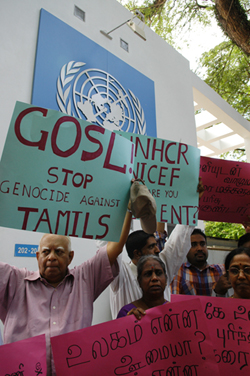 |
|
TNA parliamentarians protested last week outside the UN offices in Colombo, condemning violence by the Sri Lankan government. Photo TamilNet |
However, the Sri Lankan government rejected the TNA appeal, saying a (re-)merger was conditional on a referendum of the people of the east – reversing the 1987 Indo-Sri Lanka Accord which, bringing in the merger, said a de-merger would be conditional on a referundum.
“The Government will never act, and has no power to act against the ruling of the Supreme Court (SC) that the merger of North and East Provinces was illegal,” Sri Lanka’s Prime Minister, Ratnasiri Wickramanayake, announced in Parliament.
The exchange came a month after Sri Lanka’s Supreme Court upheld a petition by the ultra-Sinhala nationalist JVP (Janatha Vimukthi Perumana) that the procedures by which the Northern and Eastern provinces were merged in 1987 were improper.
The Premier said government was moving to divide the Northeast provincial head office based in Trincomalee so as to administer the two regions separately.
The TNA has appealed to India and the rest of the international community to support the NE merger, saying Parliament would back such a move – a reference to the main opposition UNP’s promised support.
The TNA’s Parliamentary Group leader, Mr. R. Sampanthan, spoke during the Nov 7 debate in Parliament on the extension of the Emergency.
The TNA argues that what is required now is the government takes steps to ensure the merger is effected correctly, both to honour the Indo-Sri Lanka Accord, an international treaty, and to ensure the agreement with the Tamils isn’t abrogated.
“We submit that it is the duty of this Government to take the necessary action to restore the status quo ante pertaining to the merger,” Mr. Sampanthan said.
“Procedural or technical flaws in regard to the process of merger cannot be an excuse for the non-merger,” he said, in reference to the Supreme Court ruling which last month challenged the legal procedure by which the merger had been effected.
“There is a duty cast upon the President to uphold the course of action adopted by each one of his four predecessors over a period of 18 years,” Mr. Sampanthan said.
Moreover, he noted that the Indo-Sri Lanka Agreement “did not make the constitution of the Northern and Eastern Provinces as one administrative unit having one Provincial Council conditional upon the fulfilment of any other event.”
“There is a duty cast on the President to fulfill Sri Lanka’s obligations under an International Treaty signed with neighboring India.”
“Technical grounds cannot be a valid excuse for non fulfillment of Sri Lanka’s obligation under an International Treaty,” Mr. Sampanthan said.
International law stipulates a state “may not invoke the provisions of its internal law as justification for its failure to perform a treaty” with another state, Mr. Sampanthan said, referring to the 1969 Vienna Convention, the Law of Treaties.
“If the Government makes the appropriate decision, this Parliament I have little doubt will support such a measure to restore the status quo ante,” he said.
He was referring to the United National Party (UNP)’s support for such a move were the Sri Lanka Freedom Party (SLFP) – led government to make it.
“We appeal to India and the International Community to appreciate that the restoration of the status quo ante relating to the merger is an indispensable concomitant of the peace process and urge that they contribute their best efforts to ensure that the same is done at the earliest.”
He described the moves to de-merge the Northeast as striking “at the very root of the peace process” and as nullifying the process.
“It was the struggle of the Tamil people in the North-East for substantial self-rule, which brought about new Constitutional arrangements,” he pointed out.
“The Indo-Sri Lanka Agreement and the subsequent legislative measures and arrangements were the consequence of this struggle and were intended to accommodate legitimate Tamil aspirations.”
Moreover, “any contrived dismantling of the North-East merger would remove the corner stone of the peace process. If such a situation continues, the peace process must inevitably crumble,” he said.
Neither was the Agreement’s recognition of the Tamils’ historic existence in the Northeast a novelty at the time.
“The concept of a Tamil linguistic region first came about in 1957 under the Bandaranayake-Chelvanayagam Pact which provided for the creation of regions in the Northern and Eastern Provinces and for the amalgamation of regions beyond Provincial limit,” he said. “If the BC Pact was implemented this would have become a reality in 1957.”
He pointed out “the Northern and Eastern Provinces enjoy the same linguistic character under both the 1972 and 1978 Constitutions and Tamil is the language of administration and the courts, whereas in all the other Provinces it is Sinhala.”
“The linguistic contiguity continues through the Northern and Eastern Provinces. Even the present Constitution recognizes that the majority of inhabitants of both the Northern and Eastern Provinces are Tamil speaking.”
